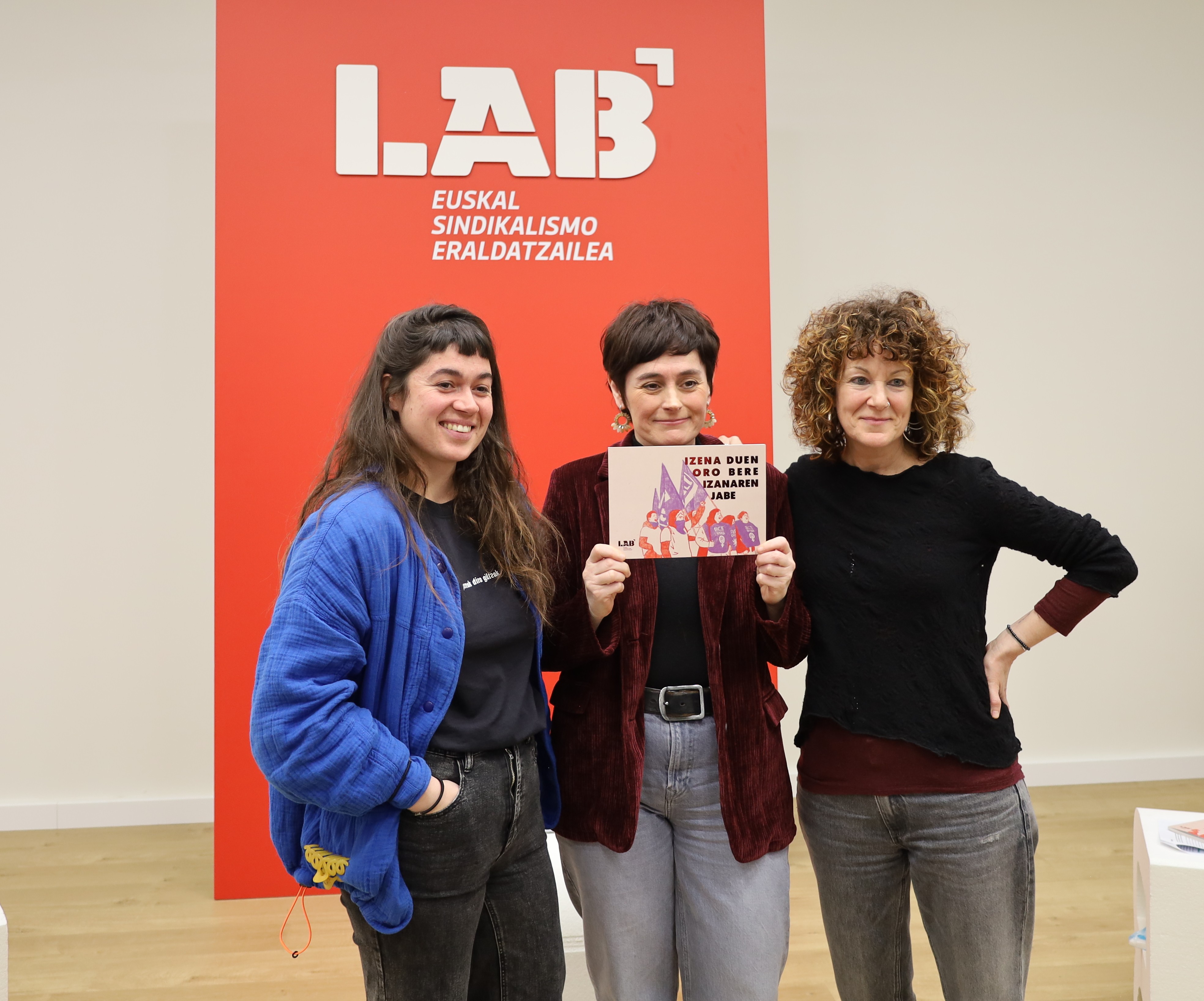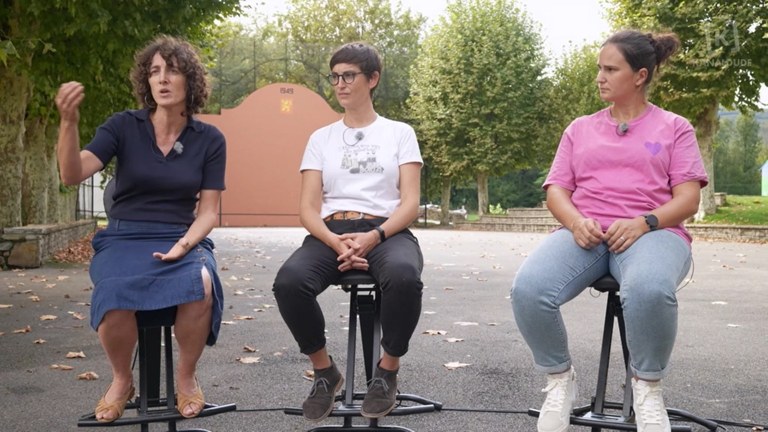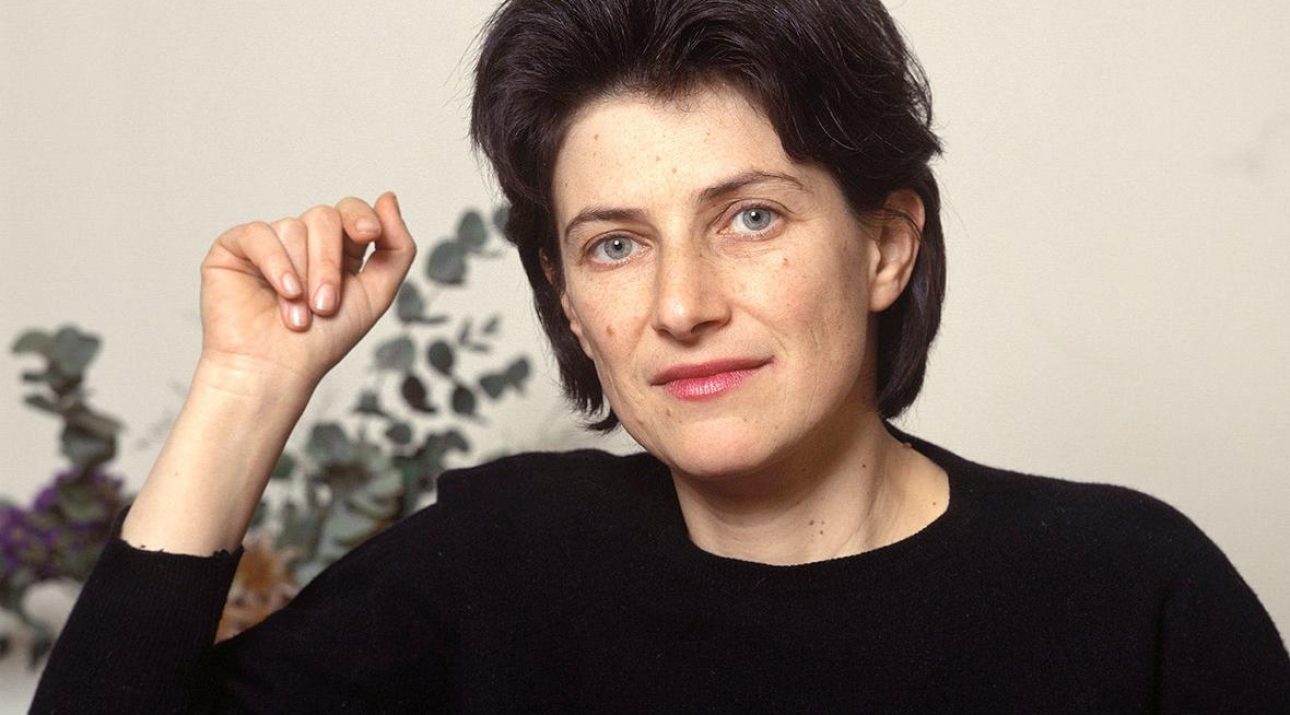"We want LAB to be the subject that makes a union contribution to the construction of a Basque Feminist Country"
- The feminist secretariat of the LAB union has published the book “Everyone with a Name”, based on the testimonies of several feminist members. “We have carried out a genealogy or a glossary or maybe both things are together or it may not be one or the other... but in any case, all these years we have tried to reflect the reflections, debates, practices and concepts that we have invented and created, all this that we have been politicizing and transforming, through all of them, we have been embodying our own feminist syndicalism”, you can read in the statement. With the recent 50th anniversary of the LAB, the book tells us about the paths, tools and challenges opened up by the union from feminism during this half-century journey. We spoke with the feminist secretary, Maddi Isasi.

I can’t say all the steps, but I can say 1996. It was in this year that the LAB Women branch was formed, with the aim of turning the union into a tool to fight against sexual oppression and to promote strategic and tactical reflection on feminism.
It was the first stone, although several women had already broken through. The Women’s Area was like a long and difficult birth, but it was possible thanks to several union members who worked hard and hard as midwives. It was a highly masculinised and especially industry-focused trade unionism at the time, where the needs and realities of working women were far from the centre. The Women’s Area would become the Feminist Secretariat in 2017.
The strength and determination of the women who have been opening this path must be highlighted.
Look at them, this book is an exercise in recognition and gratitude. Although it seems that we have a lot to gain, it must be said that today the need to maintain tension is undeniable, so that feminism can influence all areas, and therefore also syndicalism.
In the path of a feminist syndicalism, everything must be reviewed: the figure of the leader, the dynamics of the negotiating table, the imaginary of the fighter... everything.
Absolutely, absolutely, absolutely. We often say that feminist syndicalism is a concept that we are building from practice. We have been struggling for years with the goal of including a feminist perspective throughout the union, and the book includes important steps taken – from the capital/labor conflict to the capital/life conflict, the creation of a feminist secretariat, from the equality plan to the feminist plan... – but we need to make comprehensive proposals for feminist transformation. Of course, we must not only stop at the theoretical level, but we also need the tools to carry it out in trade union practice.
How's the men's position? You talk about resistance in the book.
Through this book we wanted to tell you about the process, but without putting too much makeup on. We didn’t want it to be presented as a perfect path, because that would be turning our back on the pain and anger in the union. We’ve been wandering around to see how to collect all this in the book. We believe that the book should be a tool for questioning, naming and mobilizing some of the less explicit resistances that exist today.
"We want to make syndicalism for all the workers that the system places on the margins, and for that you have to question the classic ways of making syndicalism"
When betting on feminism, it is necessary to put tools and a collective commitment to propose transformation. We are aware that we live in the reality in which we live and that patriarchy is not something that is outside of us. That’s why we’ve put several tools in place and one of them is the IV. The Feminist Planning.
What does IV entail? The Feminist Planning?
It’s a medium-term reflection bet, which has been elaborated with a view to four years from now. Beyond overcoming gender inequalities, we want LAB to be the subject that will make a union contribution to the construction of a Basque feminist country, that is, to make LAB a feminist agent in its own right. Somehow so far we have brought feminism to the union, and now what we are proposing is to take another leap: LAB as such becomes a feminist agent. This means that it must have a transversal perspective, because feminism must not be something that we add from the feminist secretariat. It must be there when it comes to conducting health screenings, when it comes to collective bargaining, when it comes to interacting with other unions, when it comes to holding workers’ assemblies, when it comes to setting the times for these meetings... always.
In recent years we have taken steps towards feminism. The LAB has a feminist school of its own, through the agreement of Emaginekila, if we work through the program Changing the Vision in the liberates of the union and in the different structures working on the basic concepts of incorporation of feminism, providing tools to transform the vision and the situation. We also have a protocol for the management of cases of macho violence. But we saw that it was time to take one more step to make LAB a feminist agent in its own right. This path is endless. As part of this collective decision, men have taken a step, but there is still a lot of resistance. The integration of a feminist perspective requires a constant elaboration on privileges. That's a lot of work, pedagogy is a lot of work.
The LAB is also leading some changes from anti-racism.
We want to make syndicalism for all the workers that the system places on the margins, and for that you have to question the classic ways of making syndicalism. For whom are we proposing syndicalism? Are women’s needs taken into account? The most racialized and migrated people? We are trying to have a structure that keeps these questions in mind all the time.
We cannot fail to mention the general feminist strike of 2022.
Previously there were other precedents that made the general feminist strike possible. It is worth mentioning the 2017 congress, in which we extended the conflict of capital/work to the conflict of capital/life. We decided to go from being a tool that would respond to the work/capital conflict to being a subject that would influence the life capital in that collision. This implies a different way of conceiving the work, giving visibility to the care tasks, in order to make visible all those works that are essential for sustaining life. In 2022 we created the department of domestic workers. In this system that wants us to be completely individualized, we bet on the collective organization, and this not only for the workers of the factories, but also for the other agents that the system places on the margins. Thus, the conditions for organizing a general feminist strike were there. There was also a reflection from the feminist movement and the decision to give centrality to the issue of care and place it on the political agenda. A step in this mutual recognition between the feminist movement and trade unionism opened the possibility of incorporating these feminist demands into the trade union agenda. We are committed to strengthening alliances with the feminist movement and we are taking steps in this direction: At Denon Vida Centro we continue in the dynamic, we deepen our commitments to bring to collective bargaining those demands defined in the People’s Agreement...
Indartsua, irribarretsua eta oso langilea. Helburu pila bat ditu esku artean, eta ideia bat okurritzen zaionean buru-belarri aritzen da horretan. Horiek dira Ainhoa Jungitu (Urduña, Bizkaia, 1998) deskribatzen duten zenbait ezaugarri. 2023an esklerosi anizkoitza... [+]
Gozamen aparta bezain deskribatzeko zaila dakar, norbaiten hitzak irakurri edo entzun ostean, zera pentsatzeak: “Horixe zen neu aurreko hartan azaltzen saiatu nintzena!”. Idazlea eta itzultzailea da María Reimóndez, eta galegoz aritzen da, hizkuntza... [+]
Orain arte desgaituak ez diren pertsonekin lehiatu da Uharteko Ipar Eski Taldeko Eneko Leyun eskiatzailea (Iruñea, 1998). 2024-2025 denboraldian, lehenengo aldiz parte hartu du Adimen Urritasuna duten Pertsonentzako Iraupeneko Eskiko Espainiako Txapelketan. Urrezko... [+]
Joan den urte hondarrean atera da L'affaire Ange Soleil, le dépeceur d'Aubervilliers (Ange Soleil afera, Aubervilliers-ko puskatzailea) eleberria, Christelle Lozère-k idatzia. Lozère da artearen historiako irakasle bakarra Antilletako... [+]
Endometriosiaren Nazioarteko Eguna izan zen, martxoak 14a. AINTZANE CUADRA MARIGORTAri (Amurrio, 1995) gaixotasun hori diagnostikatu zioten urtarrilean, lehen sintomak duela lau urte nabaritzen hasi zen arren. Gaitz horri ikusgarritasuna ematearen beharraz mintzatu da.
Duela aste batzuk, gurean egon ziren El Salvadorko eta Kanarietako emakumeen eskubideen aldeko hainbat aktibista. Sexu- eta ugalketa-eskubideez eta eskubide horiek urratzeak emakumeengan dituen ondorioez aritu gara; hala nola El Salvadorren berezko abortuak izanda homizidio... [+]
Zuberoako ohiturei buruzko bi liburu ditut gogoan. Batek XX. mendean aritu izan diren 180 dantzari eta soinulari aipatzen ditu. Haien artean, emakumezkorik ez da agertzen. Besteak, pastoralei egiten die errepasoa eta hor emakumeak aipatu aipatzen dira, baina omisio esanguratsuak... [+]
1984an ‘Bizitza Nola Badoan’ lehen poema liburua (Maiatz) argitaratu zuenetik hainbat poema-liburu, narrazio eta eleberri argitaratu ditu Itxaro Borda idazleak. 2024an argitaratu zuen azken lana, ‘Itzalen tektonika’ (SUSA), eta egunero zutabea idazten du... [+]
Donostiako Tabakaleran, beste urte batez, hitza eta irudia elkar nahasi eta lotu dituzte Zinea eta literatura jardunaldietan. Aurten, Chantal Akerman zinegile belgikarraren obra izan dute aztergai; haren film bana hautatu eta aztertu dute Itxaro Bordak, Karmele Jaiok eta Danele... [+]
Antifaxismoari buruz idatzi nahiko nuke, hori baita aurten mugimendu feministaren gaia. Alabaina, eskratxea egin diote Martxoaren 8ko bezperan euskal kazetari antifaxista eta profeminista bati.
Gizonak bere lehenengo liburua aurkeztu du Madrilen bi kazetari ospetsuk... [+]
Pertsona lodiek lodiak izateagatik bizi izan duten eta bizi duten indarkeriaren inguruan teorizatzeko espazio bat sortzea du helburu ‘Nadie hablará de nosotras’ podcastak. Cristina de Tena (Madril, 1990) eta Lara Gil (Fuenlabrada, Espainia, 1988) aktibista... [+]





















